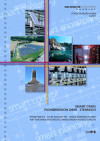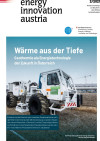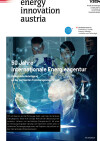Suchergebnisse für "Factsheet%3A Energietechnologien gestalten%2C die f%C3%BCr alle sinnvoll und nutzbar sind"
IEA Bioenergy: Biomass Supply and the Sustainable Development Goals – International Case Studies (2021)

37 Best-Practice-Fallstudien aus 18 Ländern wurden von den Mitgliedern des IEA Bioenergy Technology Collaboration Programme ausgewählt, um zu zeigen, wie Biomasse-Lieferketten zur Unterstützung einer nachhaltigen Bioenergieerzeugung eingesetzt werden können, während gleichzeitig ein Beitrag zu den Zielen der Vereinten Nationen für nachhaltige Entwicklung geleistet wird.
Herausgeber: IEA Bioenergy, 2021
Englisch, 94 Seiten
Downloads zur Publikation
Smart Grids Pionierregion Oberösterreich

Strategien für ein zukunftsfähiges Energiesystem mit maximalem Einsatz erneuerbarer Ressourcen.
Forschungsforum
1/2011
Herausgeber: BMVIT
Deutsch, 6 Seiten
Downloads zur Publikation
IEA Bioenergy Task 39, Newsletter, Ausgabe 64, Dezember 2023

Der Schwerpunkt dieser Ausgabe liegt auf dem Artikel zum Thema „Biofuels production and development in New Zealand“.
Tomas Ekbom, Hannah Edgren
Herausgeber: IEA Bioenergy Task 39, 2023
Englisch, 14 Seiten
Downloads zur Publikation
Workshop: Zeitstrategien ökologischer Innovationspolitik
31. Oct 2003
Tagungszentrum Katholische AkademieBerlin, DE
Auf Zeitfenster bauen? Politikstrategien für nachhaltige Bauinnovationen
Wärme aus der Tiefe

Geothermie als Energietechnologie der Zukunft in Österreich
energy innovation austria
2/2021
Herausgeber: BMK und Klima- und Energiefonds
Deutsch, 12 Seiten
Downloads zur Publikation
50 Jahre Internationale Energieagentur

Österreichs Beteiligung an der weltweiten Forschungskooperation
energy innovation austria
1/2024
Herausgeber: BMK gemeinsam mit dem Klima- und Energiefonds
Deutsch, 16 Seiten
Downloads zur Publikation
Pilotkurs Thermische/r SanierungstechnikerIn im Baugewerbe
September - Dezember 2010
HTL Mödling, Technikerstraße 1-5
2340 Mödling, AT
Der Kurs wird von September bis Dezember 2010 abgehalten. Anmeldungen können ab sofort bis zum 23. August 2010 erfolgen.
Publikationen aus dem IEA Bioenergie Task 42
Im IEA Bioenergie Task 42 wurden ein Newsletter, der Bericht "Bioeconomy Survey 2014" sowie Biorefinery Fact Sheet publiziert.
IEA EBC Annex 80: Resilient Cooling of Buildings – Policy Recommendations (2024)

Empfehlungen für regulatorische Maßnahmen
Peter Holzer, Institute of Building Research & Innovation, Österreich; Pierre Jaboyedoff, Effin’Art, Schweiz; Emmanuel Bozonnet, La Rochelle Université, Frankreich; Ronnen Levinson, Lawrence Berkeley National Laboratory, USA; Mamak P. Tootkaboni, Politecnico Torino, Italien; Vincenzo Corrado, Politecnico Torino, Italien; Ed Arens, University of California, USA; Haley Gilbert, Affiliate of Lawrence Berkeley National Laboratory; Amanda Krelling, Federal University of Santa Catarina, Brazil; Anaïs Machard, CSTB, Scientific and Technical Center for Buildings, France; Wendy Miller, Queensland University of Technology, Australia; Stephen Selkowitz, Affiliate of Lawrence Berkeley National Laboratory Hui Zhang, Lawrence Berkeley National Laboratory, USA
Herausgeber: IEA EBC Annex 80, 2024
Englisch, 75 Seiten
Downloads zur Publikation
Watersorption - Water absorption of Wood Plastic Composites
Analysis of the water absorption in Wood Plastic Composites (WPC) in order to develop solutions to decrease and stop water absorption. This enables a big variety of new applications made of WPC and brings economical and ecological advantages for the polymer processing industries.
International Symposium: Photovoltaic - Electricity from the Sun: Research - Marketing - Dissemination (Vienna, Austria)
2002-09-13 / 2002-09-14
Vienna, Chamber of Commerce Wiedner Hauptstrasse 63, A-1041 Vienna
Information about the activities in IEA-Photovoltaic Power Systems Program; experiences and status of PV in different countries, marketing, promotion incentives and dissemination strategies for photovoltaics, RTD and training.
MADOKLI - Mannersdorf climate fit! Using local resources to combat and adapt to climate change for a climate-neutral neighbourhood
Development of a climate-neutral neighbourhood by integrating previously unused heat sources and sinks, such as the underground Mühlbach stream, to supply municipal buildings, to establish use-oriented water management and to develop solutions for climate-friendly outdoor spaces in the centre of Mannersdorf am Leithagebirge.
Neue Publikationen des IEA AFC Annex 35 "Brennstoffzellen für portable Anwendungen"
Im IEA AFC Annex 35 wurden fünf Papers rund um das Thema "Brennstoffzellen für portable Anwendungen" publiziert.
Parabolrinnenkollektor für industrielle Prozesswärme
Im Rahmen eines Projektes der Programmlinie "Fabrik der Zukunft" des BMVIT wurde einkostengünstiger konzentrierender Kollektor mit kleinen Abmessungen nach dem Parabolrinnenprinzip entwickelt.
IEA DHC: Artificial Intelligence for Failure Detection and Forecasting of Heat Production and Heat demand in District Heating Networks

Abschlussbericht des Projektes “AI for Failure Detection and Heat Demand and Production Forecast”
Kramer W., Vallée M., Lamaison N., Gölzhäuser S., Wissocq T., Gaoua Y., Bitterling M., Frison L.
Herausgeber: IEA DHC, 2023
Englisch
IEA Bioenergy Task 37: Report "Treatment of pigment wastewater and generation of natural gas standard biomethane in Hangzhou, China" (2021)

Der Report gibt eine Übersicht über ein erfolgreiches Beispiel zur anaeroben Abwasserbehandlung von Pigment-Abwasser in China.
Wei, Xiaoming
Herausgeber: IEA Bioenergy Task 37, 2021
Englisch, 4 Seiten
Downloads zur Publikation
Neue Publikationen des IEA AFC Annex 31 "Polymerelektrolytmembran-Brennstoffzellen"
Im IEA AFC Annex 31 wurden drei Papers rund um das Thema "Polymerelektrolytmembran-Brennstoffzellen" publiziert.
IEA ISGAN Annex 5 (SIRFN): Interconnection Standard Grid-Support Function Evaluations Using an Automated Hardware-in-the-Loop Testbed (2018)

Im Rahmen von IEA ISGAN-SIRFN wurden auf Basis der AIT Smart Grid Converter Plattform automatisierte Tests von netzstützenden Funktionen Smarter Wechselrichter durchgeführt.
Herausgeber: IEEE Journal of Photovoltaics, vol. 8, no. 2, pp. 565-571, doi: 10.1109/JPHOTOV.2018.2794884
Englisch
IEA Bioenergy Task 32: Webinar "Residential Wood Combustion – Towards Low Emission Systems" (2021)

IEA Bioenergy Task 32 veranstaltete am 6. Mai 2021 ein internationales Webinar mit dem Titel "Residential Wood Combustion - Towards Low Emission Systems".
Herausgeber: IEA Bioenergy Task 32, 2021
Englisch
In der Praxis angekommen: Fallbeispiele zu Building Information Modeling (BIM) entlang des gesamten Lebenszyklus eines Gebäudes
11. Oktober 2018
COOL MAMA Hotel Salzburg, Josef-Brandstätter-Straße 1, 5020 Salzburg, AT
Im Rahmen der Veranstaltung werden anhand von mehreren Fallbeispielen Building Information Modeling (BIM) Projekte entlang des gesamten Lebenszyklus eines Gebäudes präsentiert. Weiters werden rechtliche Aspekte einer BIM Ausschreibung thematisiert.
